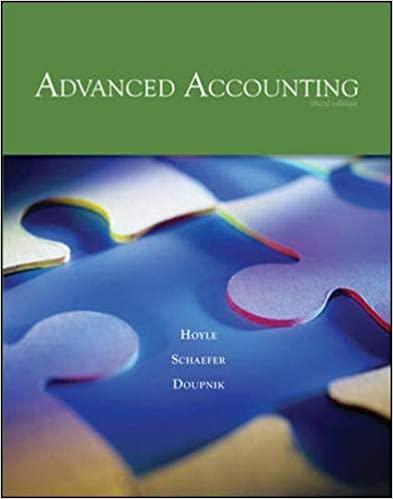On January 1, 2008, Parker, Inc., a U.S.-based firm, acquired 100 percent of Suffolk PLC located in
Question:
On January 1, 2008, Parker, Inc., a U.S.-based firm, acquired 100 percent of Suffolk PLC located in Great Britain for consideration paid of 52,000,000 British pounds (£), which was equal to fair value. The excess of fair value over book value is attributable to land (part ofproperty, plant, and equipment) and is not subject to depreciation. Parker accounts for its investment in Suffolk at cost. On January 1, 2008, Suffolk reported the following balance sheet:
Cash.£ 2,000,000 Accounts payable LO6 Accounts receivable. 3,000,000 Long-term debt . .
Inventory. 14,000,000 Common stock . .
Property, plant, and Retained earnings .
equipment(net). 40,000,000
£ 59,000,000
£ 1,000,000 8,000,000 44,000,000 6,000,000
£59,000,000 Suffolk’s 2008 income was recorded at £2,000,000. It declared and paid no dividends in 2008.
On December 31, 2009, two years after the date of acquisition, Suffolk submitted the following trial balance to Parker for consolidation:
Cash.£ 1,500,000 Accounts Receivable. 5,200,000 Inventory. 18,000,000 Property, Plant, and Equipment (net). 36,000,000 AccountsPayable. (1,450,000)
Long-TermDebt. (5,000,000)
Common Stock.(44,000,000)
Retained Earnings(1/1/09). (8,000,000)
Sales.(28,000,000)
Cost of Goods Sold.16,000,000 Depreciation.2,000,000 Other Expenses.6,000,000 Dividends Paid(1/30/09). 1,750,000
-0-
Other than paying dividends, no intercompany transactions occurred between the two companies. Relevant exchange rates for the British pound follow:
January 1 January 30 Average December 31 2008
$1.60
$1.61
$1.62
$1.64 2009 1.64 1.65 1.66 1.68 The December 31, 2009, financial statements (before consolidation with Suffolk) follow. Dividend income is the U.S. dollar amount of dividends received from Suffolk translated at the $1.65/£ exchange rate at January 30, 2009. The amounts listed for dividend income and all affected accounts (i.e., net income, December 31 retained earnings, and cash) reflect the $1.65/£ exchange rate at January 30, 2009. Credit balances are in parentheses.
Parker Sales. S (70,000,000)
Cost of goods sold. 34,000,000 Depreciation. 20,000,000 Otherexpenses. 6,000,000 Dividendincome. (2,887,500)
Netincome. $(12,887,500)
Retained earnings, 1/1/09. $(48,000,000)
Net income, 2009.(12,887,500)
Dividends, 1/30/09. 4,500,000 Retained earnings, 12/31/09. $ (56,387,500)
Cash. $ 3,687,500 Accounts receivable. 10,000,000 Inventory. 30,000,000 Investment in Suffolk. 83,200,000 Plant and equipment(net). 105,000,000 Accounts payable.(25,500,000)
Long-termdebt. (50,000,000)
Commonstock. (100,000,000)
Retained earnings, 12/31/09. (56,387,500)
-0-
Parker’s chief financial officer (CFO) wishes to determine the effect that a change in the value of the British pound would have on consolidated net income and consolidated stockholders’ equity. To help assess the foreign currency exposure associated with the investment in Suffolk, the CFO requests assis¬ tance in comparing consolidated results under actual exchange rate fluctuations with results that would have occurred had the dollar value of the pound remained constant or declined during the first two years of Parker’s ownership.
Required Use an electronic spreadsheet to complete the following four parts:
Part I. Given the relevant exchange rates presented,
a. Translate Suffolk’s December 31, 2009, trial balance from British pounds to U.S. dollars. The British pound is Suffolk’s functional currency.
b. Prepare a schedule that details the change in Suffolk’s cumulative translation adjustment (beginning net assets, income, dividends, etc.) for 2008 and 2009.
c. Prepare the December 31,2009, consolidation worksheet for Parker and Suffolk.
d. Prepare the 2009 consolidated income statement and the December 31, 2009, consolidated bal¬ ance sheet.
Note: Worksheets should possess the following qualities:
• Each spreadsheet should be programmed so that all relevant amounts adjust appropriately when dif¬ ferent values of exchange rates (subsequent to January 1, 2008) are entered into it.
• Be sure to program Parker’s dividend income, cash, and retained earnings to reflect the dollar value of alternative January 30, 2009, exchange rates.
Part II. Repeat tasks (a), (b), (c), and
(d) from Part I to determine consolidated net income and consolidated stockholders’ equity if the exchange rate had remained at $1.60/£ over the period 2008 to 2009.
Part III. Repeat tasks (a), (b), (c), and
(d) from Part I to determine consolidated net income and con¬ solidated stockholders’ equity if the following exchange rates had existed:
January 1 January 30 Average December 31 2008 $1.60 $1.59 $1.58 $1.56 2009 1.56 1.55 1.54 1.52 Part IV. Prepare a report that provides Parker’s CFO the risk assessments requested. Focus on prof¬ itability, cash flow, and the debt-to-equity ratio.
Step by Step Answer:

Advanced Accounting
ISBN: 9780073379456
9th Edition
Authors: Joe Ben Hoyle, Timothy S. Doupnik, Thomas F. Schaefer, Oe Ben Hoyle





